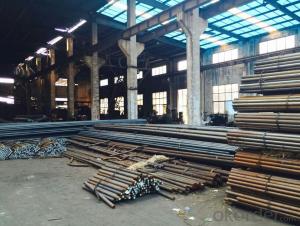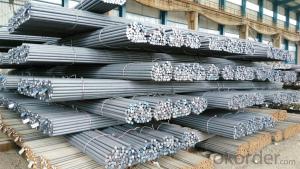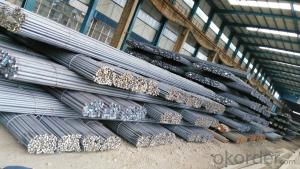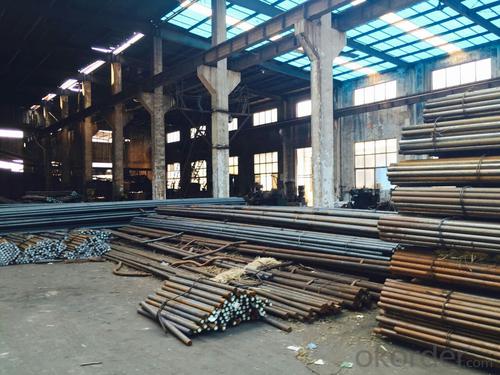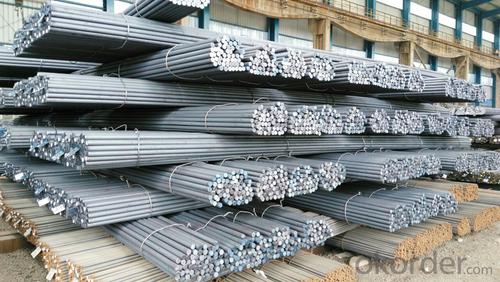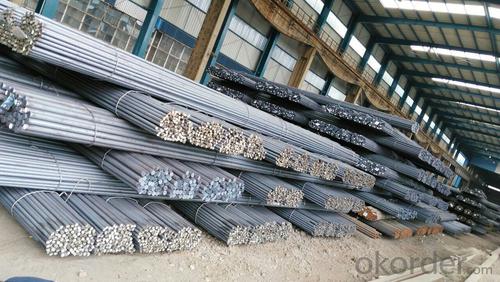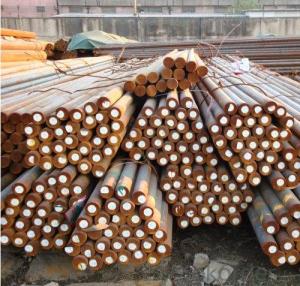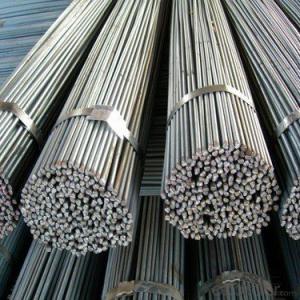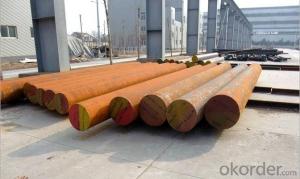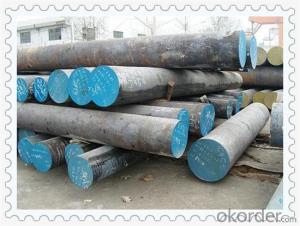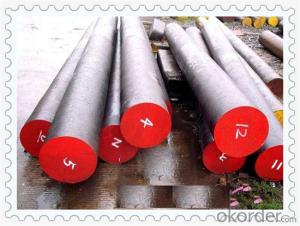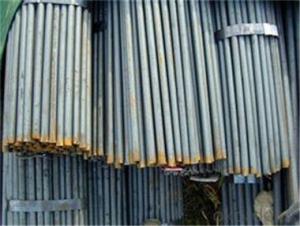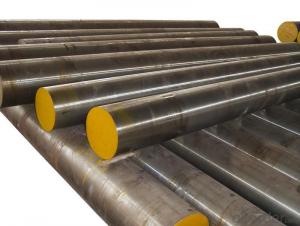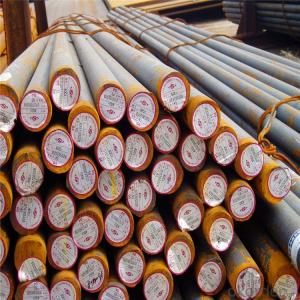45# Carbon Steel Hot Rolled Bars Forged Bars
- Loading Port:
- Tianjin
- Payment Terms:
- TT OR LC
- Min Order Qty:
- 25 m.t.
- Supply Capability:
- 50000 m.t./month
OKorder Service Pledge
OKorder Financial Service
You Might Also Like
Specification
45# Carbon Steel Hot Rolled Bars Forged Bars
Product Details:
Name:45# Carbon Steel Hot Rolled Bars Forged Bars
Place of Origin:Liaoning,China Brand Name:Dongbei Tegang
Shape:round bar Material: Alloy Structural Steel
Steel Grade: AISI 1045/JIS S45C/DIN C45/GB 45
Size:Diameter:16mm~350mm
Application:used in making high strengthened and wear resistant parts that works under high pressure, like axle, spring ring, axletree, cam, and steel sling etc.
Chemical Composition:
C | Si | Mn | Cr | Ni | Cu | P | S |
0.38-0.43 | 0.17-0.37 | 0.50-0.80 | ≤0.25 | ≤0.30 | ≤0.35 | ≤0.035 | ≤0.035 |
Characteristics:
- High hardness, strength and toughness.
- Poor plasticity during cold deformation.
- Medium machinability.
- Poor weldability.
- Poor hardenability.
- Cracks is often caused during water quenching process.
- Large parts should be in normalizing treatment.
Application:
45# Carbon Steel Hot Rolled Bars Forged Bars can be used to be manufactured roller, shaft, tyre, spring ring, damping spring, clutch and steel wire rope, etc.
Product Show:
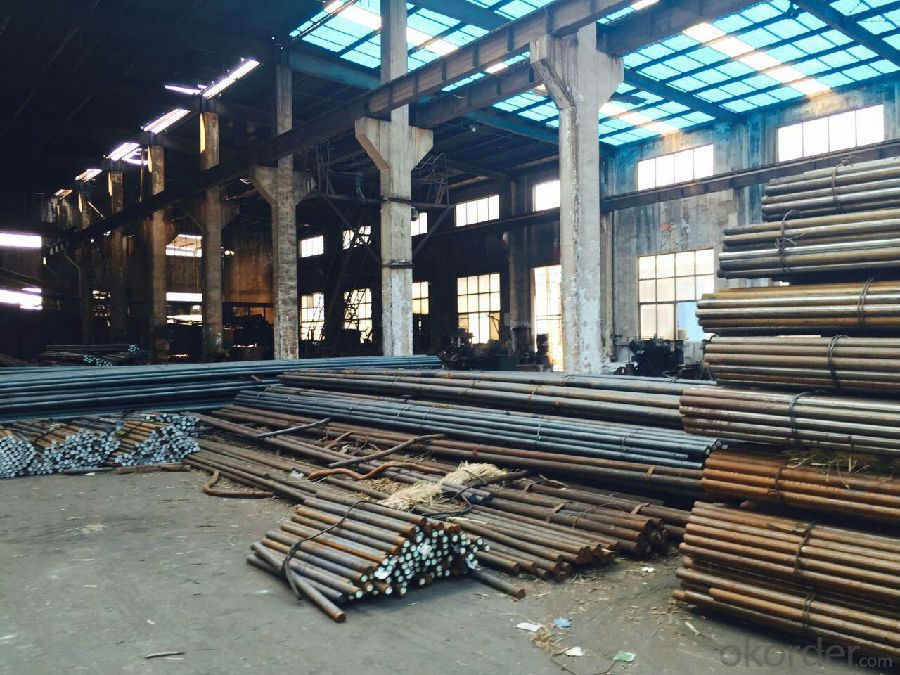
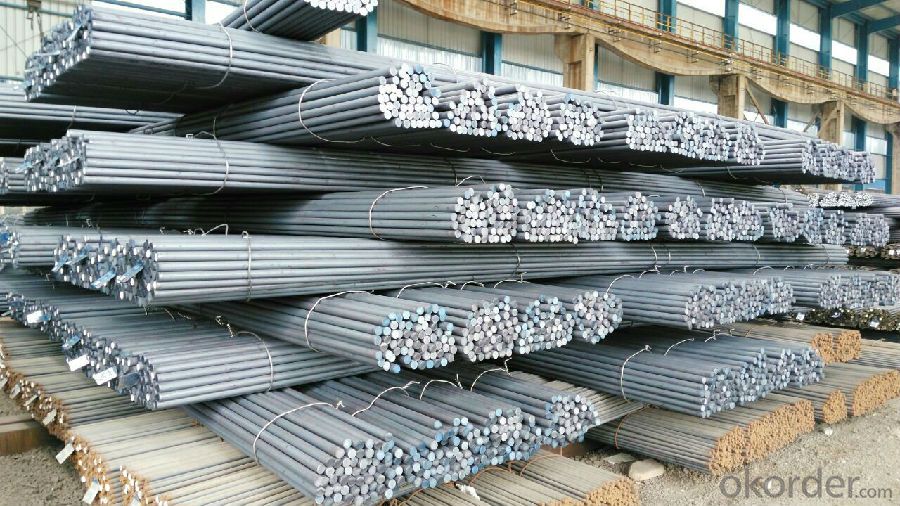
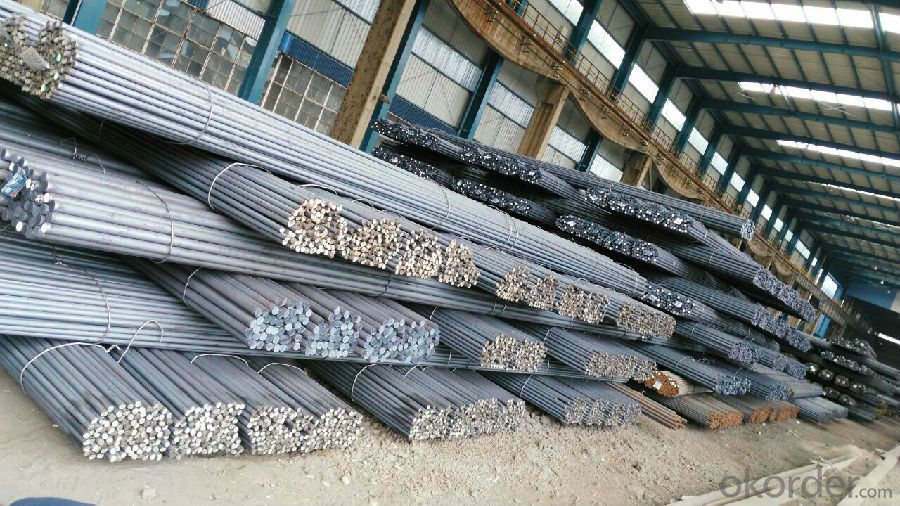
- Q: How does special steel contribute to the medical aftermarket industry?
- Special steel plays a crucial role in the medical aftermarket industry by providing high-quality materials necessary for manufacturing medical devices and equipment. Special steel, also known as stainless steel, offers numerous advantages that make it ideal for medical applications. First and foremost, special steel is highly resistant to corrosion and rust, which is essential in the medical field where hygiene and cleanliness are of utmost importance. Medical devices like surgical instruments, implants, and equipment need to be sterilized frequently, and the corrosion resistance of special steel ensures their durability and longevity. Additionally, special steel possesses excellent strength and hardness properties, making it suitable for medical implants and prosthetics. These implants must be strong enough to endure the stresses and strains of the human body while maintaining their structural integrity. Special steel provides the necessary strength and toughness required for these critical applications. Furthermore, special steel is biocompatible, meaning it does not cause any adverse reactions or toxicity when in contact with living tissues. This property is essential for implants and devices that come into direct contact with the human body, as it minimizes the risk of rejection or allergic reactions. Moreover, special steel's versatility allows it to be easily machined and fabricated into complex shapes and sizes, meeting the diverse requirements of medical applications. It can be formed into delicate surgical instruments, precision cutting tools, and even large-scale equipment such as hospital beds and imaging machines. The high precision and dimensional stability of special steel contribute to the accuracy and reliability of medical devices. This is especially crucial in areas like diagnostics and imaging, where precise measurements and high-quality images are vital for accurate diagnosis and treatment planning. In conclusion, special steel's corrosion resistance, strength, biocompatibility, and versatility make it an invaluable material in the medical aftermarket industry. Its use in manufacturing medical devices and equipment ensures the highest standards of hygiene, durability, and performance, ultimately contributing to the advancement of healthcare and improving patient outcomes.
- Q: How is magnetic stainless steel used in the production of magnetic components?
- Magnetic stainless steel is commonly used in the production of magnetic components due to its unique combination of corrosion resistance and magnetic properties. It is particularly suitable for applications where both strength and resistance to oxidation are required. The stainless steel is typically formed into various shapes and sizes, such as rods or sheets, and then processed into the desired magnetic component. This can include items like magnets, transformer cores, or magnetic shielding components. The magnetic properties of the stainless steel facilitate efficient magnetization, making it a valuable material for the production of magnetic components in various industries.
- Q: What are the requirements for special steel used in construction equipment manufacturing?
- The requirements for special steel used in construction equipment manufacturing typically include high strength, durability, and resistance to wear and corrosion. Additionally, the steel should have good weldability and machinability to ensure ease of fabrication. It should also possess excellent impact resistance to withstand heavy loads and harsh working conditions.
- Q: Can special steel be used in the manufacturing of tools?
- Yes, special steel can be used in the manufacturing of tools. Special steels, such as high-speed steel, tool steel, and alloy steel, are specifically designed to have exceptional strength, hardness, and durability properties. These characteristics make special steel ideal for tool manufacturing, as it can withstand high temperatures, resist wear and corrosion, and provide the necessary toughness required for various cutting, shaping, and drilling applications.
- Q: Can special steel be used for making marine components?
- Yes, special steel can be used for making marine components. Special steel is often chosen for its corrosion resistance, strength, and durability, which are crucial properties required for components used in marine environments. These components need to withstand exposure to seawater, harsh weather conditions, and extreme pressures. Special steel alloys such as stainless steel or duplex steel are commonly used for marine applications due to their excellent resistance to corrosion and ability to maintain structural integrity in marine environments.
- Q: What are the requirements for special steel used in food processing equipment?
- Ensuring the safety and hygiene of food during processing relies heavily on the crucial requirements for special steel used in food processing equipment. The following are key considerations: 1. Corrosion resistance: The steel utilized in food processing equipment must possess exceptional resistance against corrosion. It should withstand exposure to various food products, cleaning agents, and environmental conditions without degradation or food contamination. 2. Hygienic properties: To facilitate easy cleaning and prevent the growth of harmful microorganisms, the steel should have a smooth surface finish, devoid of cracks, pits, or crevices where bacteria or food particles can accumulate. 3. Non-reactivity: The steel employed in food processing equipment must not react with the food or modify its taste, color, or odor. It should be chemically inert, releasing no substances that could compromise the food's quality or cause contamination. 4. High temperature resistance: Food processing often involves high-temperature operations like cooking, sterilization, or pasteurization. Therefore, the special steel used in such equipment must endure these extreme temperatures without compromising its structural integrity or releasing harmful substances. 5. Mechanical strength: The steel must possess adequate mechanical strength to endure the operational stresses of the processing equipment, such as pressure, vibration, or impact. This ensures durability and prevents any failures or breakages during operation. 6. Compliance with regulations: The special steel utilized in food processing equipment must meet specific regulatory standards and certifications pertaining to food safety and hygiene, such as those set by the FDA (Food and Drug Administration) or NSF (National Sanitation Foundation). Complying with these regulations guarantees the equipment's suitability for use in the food industry. In summary, the requirements for special steel used in food processing equipment focus on ensuring the equipment's durability, cleanliness, and safety while upholding the quality and integrity of the processed food.
- Q: What are the requirements for special steel used in packaging machinery?
- The specifications for the special steel utilized in packaging machinery can differ depending on the specific application and type of packaging machinery employed. Nonetheless, there are certain common expectations for this type of steel. To begin with, it is crucial for the special steel employed in packaging machinery to exhibit exceptional resistance to corrosion. This is because packaging machinery frequently comes into contact with various liquids, such as water, oils, and cleaning solutions. The corrosion resistance feature aids in preventing the steel from deteriorating or rusting when exposed to these substances, thereby ensuring the longevity and dependability of the machinery. Secondly, the steel should possess a high level of hardness and wear resistance. Packaging machinery often entails moving parts and components that are constantly subjected to friction and wear. Therefore, the steel employed in these parts must be capable of enduring repetitive contact and abrasion without undergoing significant wear or deformation. The high level of hardness also helps in preventing the formation of scratches or grooves on the surfaces, which could compromise the quality of the packaging. Furthermore, the special steel should possess good machinability and formability. Packaging machinery frequently requires complex shapes and intricate designs, necessitating steel that can be easily machined and formed into the desired shapes and sizes. This facilitates the manufacturing process and allows for the creation of precise and accurate components. Additionally, the steel should possess high tensile strength and toughness. Packaging machinery may be subjected to mechanical stresses and impacts during operation, and the steel used in its construction must be capable of withstanding these forces without fracturing or breaking. The high tensile strength ensures the structural integrity of the machinery, while toughness helps in preventing the formation of cracks or fractures under sudden loads or impacts. Lastly, the special steel employed in packaging machinery should be cost-effective and readily available. The cost of the steel should be reasonable and within the manufacturer's budget, without compromising the quality or performance of the machinery. Additionally, the steel should be readily available in the market to ensure a continuous supply for manufacturing purposes. In conclusion, the requirements for special steel used in packaging machinery encompass corrosion resistance, high hardness and wear resistance, good machinability and formability, high tensile strength and toughness, as well as cost-effectiveness. Fulfilling these requirements guarantees the durability, reliability, and efficiency of the packaging machinery in various industrial applications.
- Q: How is special steel used in the construction industry?
- Special steel is used in the construction industry for a variety of purposes such as reinforcing concrete structures, constructing high-rise buildings, manufacturing heavy machinery, and producing durable and corrosion-resistant components. It provides strength, flexibility, and longevity to construction projects, ensuring their safety and structural integrity.
- Q: How does special steel contribute to the manufacturing of cutting blades?
- Special steel is crucial in the manufacturing of cutting blades as it offers exceptional hardness, durability, and resistance to wear and corrosion. These properties allow cutting blades to maintain sharpness for longer periods of time, resulting in more efficient and precise cutting operations. Additionally, special steel can be tailored to specific requirements, enabling the production of cutting blades suitable for different applications, such as those used in industries like automotive, aerospace, or construction.
- Q: Is special steel suitable for manufacturing firearms?
- Yes, special steel is highly suitable for manufacturing firearms. Special steel alloys are specifically designed to possess exceptional properties such as high strength, hardness, and resistance to wear and corrosion. These characteristics are crucial for firearms as they need to withstand high pressures, recoil forces, and intense heat generated during firing. Special steel alloys, such as stainless steel or chrome-molybdenum steel, offer excellent tensile strength, allowing firearms to handle the immense pressure generated by the ignition of gunpowder. Moreover, the hardness of special steel ensures that the critical components, such as barrels and receivers, are durable and can withstand repeated use without deforming or cracking. Firearms also require resistance to wear and corrosion, as they are often exposed to harsh environments and various weather conditions. Special steel alloys are engineered to have superior resistance to both wear and corrosion, ensuring that the firearms remain functional and reliable even after prolonged use or exposure to moisture. Furthermore, special steel alloys can be easily machined and formed into complex shapes, allowing manufacturers to create intricate firearm components with precision. This versatility in manufacturing processes enables the production of firearms that meet stringent quality standards and precise specifications. In conclusion, special steel is unquestionably suitable for manufacturing firearms due to its exceptional strength, hardness, resistance to wear and corrosion, and ease of machining. These properties ensure the reliability, durability, and performance of firearms, making special steel an ideal material choice for this purpose.
Send your message to us
45# Carbon Steel Hot Rolled Bars Forged Bars
- Loading Port:
- Tianjin
- Payment Terms:
- TT OR LC
- Min Order Qty:
- 25 m.t.
- Supply Capability:
- 50000 m.t./month
OKorder Service Pledge
OKorder Financial Service
Similar products
Hot products
Hot Searches
Related keywords
